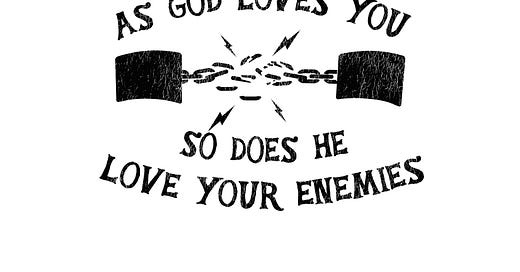Forgiveness is easy to think about. It’s easy to write about. It can get us into the scriptures and make us feel … Christian. Actually forgiving someone, however, is very, very difficult (for me). It is a serious matter that gets skimmed over, I feel, because of the temporary moral relief we get when we just agree to “move on.”
“Letting it go” is not what I’m talking about here. “Moving on” is fine and good in many circumstances, but forgiveness involves revisiting an injury and the one who injured us and seeing God before us instead of them.
This is the same thing as keeping our eyes on the Resurrection. The Resurrection keeps things simple. Simple does not mean easy. Cutting across Panama to make a shortcut is a simple idea. Cutting the Panama canal was not easy.
If we can see Christ in the place of the one who injured us, we should instantly be humbled. We should instantly beg for forgiveness and not seek the contrition of the other. (I fail to do this - just about all the time - but I have a lingering awareness, and that is a good thing.)
This simple, radical view of forgiveness keeps me at the foot of the cross with my face pressed to Jesus’ feet. It keeps my eyes on Christ. I recall the scripture that says the kingdom is taken by force. When I want forgiveness, I must forgive, and that usually means that I have to hack away large plaques from myself, from my spirit, like chiseling away marble to make a sculpture. With force.
The vision I had of my injury-causing neighbor face down before me or shamed in some way, becomes me. I am the lowly one. This painful realization is the Gospel.
SCRIPTURE
Here is a part of Matthew:
But when you pray, go into your room and shut the door and pray to your Father who is in secret…
Pray then like this:
Our Father which art in heaven, Hallowed be thy name.
Thy kingdom come, Thy will be done in earth, as it is in heaven.
Give us this day our daily bread.
And forgive us our debts, as we forgive our debtors.
And lead us not into temptation, but deliver us from evil: For thine is the kingdom, and the power, and the glory, forever. Amen.
For if ye forgive men their trespasses, your heavenly Father will also forgive you:
But if ye forgive not men their trespasses, neither will your Father forgive your trespasses.
From C.S. Lewis:
“A great deal of our anxiety to make excuses comes from not really believing in it, from thinking that God will not take us to Himself again unless He is satisfied that some sort of case can be made out in our favor. But that is not forgiveness at all. Real forgiveness means looking steadily at the sin, the sin that is left over without any excuse, after all allowances have been made, and seeing it in all its horror, dirt, meanness, and malice, and nevertheless being wholly reconciled to the man who has done it.”
“To excuse, what can really produce good excuses is not Christian charity; it is only fairness. To be a Christian means to forgive the inexcusable, because God has forgiven the inexcusable in you. This is hard. It is perhaps not so hard to forgive a single great injury. But to forgive the incessant provocations of daily life — to keep on forgiving the bossy mother-in-law, the bullying husband, the nagging wife, the selfish daughter, the deceitful son — How can we do it? Only, I think, by remembering where we stand, by meaning our words when we say in our prayers each night “Forgive our trespasses* as we forgive those that trespass against us.” We are offered forgiveness on no other terms. To refuse it is to refuse God’s mercy for ourselves. There is no hint of exceptions and God means what He says.” (From Essay on Forgiveness C.S. Lewis By Macmillan Publishing Company, Inc. N.Y. 1960)
From Tolkkein:
Saruman turned to go, and Wormtongue shuffled after him. But even as Saruman passed close to Frodo a knife flashed in his hand, and he stabbed swiftly. The blade turned on the hidden mail-coat and snapped. A dozen hobbits, led by Sam, leaped forward with a cry and flung the villain to the ground. Sam drew his sword.
‘No, Sam!’ said Frodo. ‘Do not kill him even now. For he has not hurt me. And in any case I do not wish him to be slain in this evil mood. He was great once, of a noble kind that we should not dare to raise our hands against. He is fallen, and his cure is beyond us; but I would still spare him, in the hope that he may find it.’ (The Lord of the Rings: The Return of the King, “The Scouring of the Shire”)
While not directly related to forgiveness, the following excerpt touched me.
In 1944, the Russian poet Yevgeny Yevtushenko’s mother took him from Siberia to Moscow. They were among those who witnessed a procession of twenty-thousand German war prisoners marching through the streets of Moscow:
The pavements swarmed with onlookers, cordoned off by soldiers and police. The crowd was mostly women — Russian women with hands roughened by hard work, lips untouched by lipstick, and with thin hunched shoulders which had borne half of the burden of the war. Every one of them must have had a father or a husband, a brother or a son killed by the Germans. They gazed with hatred in the direction from which the column was to appear.
At last we saw it. The generals marched at the head, massive chins stuck out, lips folded disdainfully, their whole demeanor meant to show superiority over their plebian victors.
“‘They smell of perfume, the bastards,” someone in the crowd said with hatred. The women were clenching their fists. The soldiers and policemen had all they could do to hold them back.
All at once something happened to them. They saw German soldiers, thin, unshaven, wearing dirty blood-stained bandages, hobbling on crutches or leaning on the shoulders of their comrades; the soldiers walked with their heads down. The street became dead silent — the only sound was the shuffling of boots and the thumping of crutches.
Then I saw an elderly women in broken-down boots push herself forward and touch a policeman’s shoulder, saying, “Let me through.” There must have been something about her that made him step aside. She went up to the column, took from inside her coat something wrapped in a colored handkerchief and unfolded it. It was a crust of black bread. She pushed it awkwardly into the pocket of a soldier, so exhausted that he was tottering on his feet. And now from every side women were running toward the soldiers, pushing into their hands bread, cigarettes, whatever they had. The soldiers were no longer enemies. They were people. (A Precocious Autobiography, Yevgeny Yevtushenko, Collins, London — found at https://www.orthodox.net/gleanings/forgiveness.html)
CHURCH FATHERS
“No one is as good and kind as the Lord is; but He does not forgive one who does not repent.” — St. Mark the Ascetic
POEM
“To My Mother” by Wendell Berry, from Entries. © Pantheon Books
I was your rebellious son,
do you remember? Sometimes
I wonder if you do remember,
so complete has your forgiveness been.
So complete has your forgiveness been
I wonder sometimes if it did not
precede my wrong, and I erred,
safe found, within your love,
prepared ahead of me, the way home,
or my bed at night, so that almost
I should forgive you, who perhaps
foresaw the worst that I might do,
and forgave before I could act,
causing me to smile now, looking back,
to see how paltry was my worst,
compared to your forgiveness of it
already given. And this, then,
is the vision of that Heaven of which
we have heard, where those who love
each other have forgiven each other,
where, for that, the leaves are green,
the light a music in the air,
and all is unentangled,
and all is undismayed.
Thank you for reading over this publication. See my other cultural inputs at
SethTummins.com
ApologyApparel.com
Inscribed - sethtummins@substack.com
on Instagram @sethtummins
How I need you.
Lord Jesus Christ, son of God, have mercy on me, a sinner.







